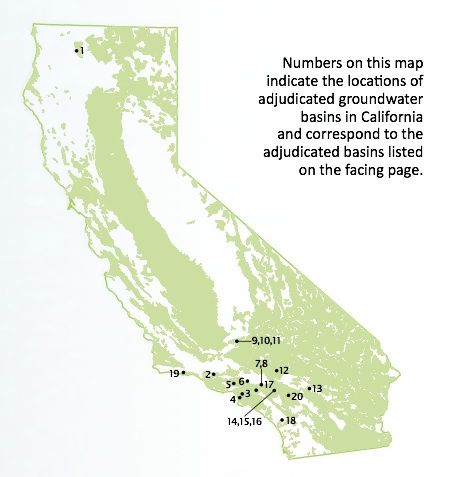Groundwater takeover would prove costly
by John Seiler | August 11, 2014 8:58 am
 In 2010, I did some freelance work for Susan Trager, one of California’s top water lawyers. Unfortunately she died in 2011.
In 2010, I did some freelance work for Susan Trager, one of California’s top water lawyers. Unfortunately she died in 2011.
Even though I had been writing about California since 1987 and had a general idea of state water policy, until I worked for Susan I had no idea how complex, developed and even rational water policy is.
In California, water rights and use mostly are “adjudicted.” The rights are mostly private, as are the lawyers involved; but the state courts system referees disputes. Other than the courts, the state is involved only if the state itself has water rights. Even the federal government, because of federal law, follows state adjudication decisions. The ultimate adjudicator is the California Supreme Court.
The adjudications sometimes can take decades. Yet somehow, it works. Along with federal bankruptcy court, California water adjudication is one of the few areas of government that actually works fairly well.
This system, which is more than 100 years old, now is endangered because state legislators are using the drought as an excuse to increase their control over private water. The Los Angeles Times reported[1]:
California continues to endure a calamitous lack of water from the sky, the state could, for the first time, start to regulate water drawn from the ground.
Groundwater regulation has been politically poisonous since the state’s founding. But lawmakers and Gov. Jerry Brown’s administration are hoping to capitalize on the current parched conditions, and cautious cooperation from once-resistant interest groups, to pass a plan for a groundwater management system by the end of the month.
“This falls under the category of: Never let a crisis go to waste,” said Assemblyman Roger Dickinson (D-Sacramento), an author of the legislation.
That last quote was a paraphrase of Rahm Emanuel when he was President Clinton’s first chief of staff, “You never let a serious crisis go to waste. And what I mean by that it’s an opportunity to do things you think you could not do before.”
Perspective
My colleague Wayne Lusvardi has been writing about[2] this here on CalWatchDog.com. From my political perspective, here are a couple of things:
1. Given that the current system is old, well established and works fairly well, anything else will be more expensive. That means we’ll all end up paying more for water.
2. Much of the higher water expense will go to lawyers. Usually when government uses eminent domain to grab property, it goes after Jose’s Muffler Shop or Anita’s small home. This time they would be going up against some of the sharpest lawyers in the state.
3. The U.S. Supreme Court strongly has established “takings” law, in which any property taken from citizens through eminent domain must be compensated. Here’s a summary from Public CEO[3] of the Koontz v. St. Johns River Water Management District decision just last year:
In a potentially groundbreaking land-use decision, the U.S. Supreme Court recently ruled in a sharply divided decision that the denial of a permit to develop wetlands property in Florida could be a taking of property under the Fifth Amendment. What this decision means to local government agencies that issue development permits remains to be sorted out. The justices who dissented warned that the majority opinion places a dark cloud of uncertainty over land use permit fees relied upon by local governments throughout the United States. The majority opinion, on the other hand, suggests that the dissent’s fears are exaggerated, if not entirely off the mark. In California, it would not be surprising if some developers attempt to use the decision to challenge land use decisions and permit fees. But existing California law already lines up to some extent with the decision rendered by the nation’s highest court.
You can bet the Koontz decision would be cited in any lawsuits against the state insisting that any state legislation taking groundwater, or reducing groundwater rights, be compensated out of the state treasury. That could cost billions.
And where is the Legislature going to get those billions? The only way would be to add a fee to your water bill.
- Los Angeles Times reported: http://www.latimes.com/local/politics/la-me-pol-water-20140810-story.html
- has been writing about: http://calwatchdog.com/?s=lusvardi+adjudication
- from Public CEO: http://www.publicceo.com/2013/07/u-s-supreme-court-rules-on-takings-claim-sea-change-in-land-use-regulation-or-business-as-usual/
Source URL: https://calwatchdog.com/2014/08/11/groundwater-takeover-would-prove-costly/